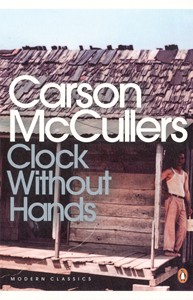Recommended for adults.
Another profound examination of life by this blighted soul, Carson McCullers. It opens with Malone, a small town pharmacist, being told he has leukaemia and a year to live. During the novel he reflects on his life, ponders his own death, while meeting his friends and customers. He also discovers somethings about himself, some good and some not.

The novel becomes a sustained critique of racism, though the word ‘critique’ is not right. ‘Satire’ might be a better word were the subject not so immediate and serious. In these pages two blacks are killed, each murder involves a law officer, but nothing is done to apprehend the perpetrators. Indeed one is killed by a police officer on the street in daylight.
It is not all grim. The Judge’s breakfast is told as an act of loving tenderness. That man loves to eat and is digging his own grave with his teeth, as he says. He has a cracked-brain plan to revive his political career by proposing that the hated Federal Government (Dwight Eisenhower was president at the time) convert Confederate dollars into coin of the realm. His grandson Jester, whom the widowed Judge loves beyond word, rejects this along with the Judge’s ingrained white supremacist attitude and by chance seeks out the company of a black man who is unreliable and suspicious, and yet there is some rapport between them that each recognizes and neither understands.
The Judge’s wife died years ago, and his son committed suicide quite a time ago, too, and that hangs over the Judge and all who mix with him.
Malone goes through the five stages of grief for himself, denial and isolation, anger, bargaining, depression, and acceptance. But Malone does not figure in the middle of the story.
There the principals are Judge Fox Clane, his dead son John Clane whom we meet in retrospect, his grandson Jester, and the black Sherman Pew. John Clane, though married came to love another woman who in turn had a sexual liaison with a black man which produced Sherman. John Clane defended this black lover when accused of the murder of the estranged husband of this other woman, and John Clane lost and so did his client. Then the woman rejected him and so he took his own life, twice over a failure. This is revealed piece-by-piece in the middle of the novel. The Judge knows all and indeed he presided at the trial where his son defended the hopeless cause. That may seem strange to law students, but reality is a lot more confused than textbooks.
Judge Fox Clane is portrayed as a nearly perfect fool. When Jester, Sherman, or others ridicule him, he genuinely thinks it is praise, etc. He even confides his plan to cash in Confederate dollars and almost proposes a return to slavery to the black Sherman Pew and then is puzzled when he – Sherman – gets mad. The Judge is not clever like a fox, despite his name. This staunch defender of white supremacy is incoherent and babbling most of the time with zero self-knowledge. Perhaps his most pitiful hour is when he goes on radio to denounce the Supreme Court ruling in Brown vs the Board of Education of Topeka Kansas and can only recite Lincoln’s Gettysburg address because it the only thing he can call to mind, apart from swearing, such are his limited power of thought and concentration. So he quotes Lincoln to the consternation of the radio station personnel.
There are many earlier pitiful moments for the Judge but he usually does not himself notice. That is the satire, I guess, of the bigoted southern official, pompous, stupid, and incompetent, but nonetheless a leader. (Brown was in 1954. I have been to that school which is now a museum.)
When Sherman finds out his origins, he rebels and in the end is murdered by a white racist thug encouraged by the Judge in his foggy way. Malone first drew the lot to murder Sherman but he refused and so discovered something in himself. His story bookends the novel. It starts with his diagnosis and ends with his death. Sherman has been portrayed throughout as lost between two worlds, neither black nor white, and though neither of them knew the background, Sherman and Jester become friends in a bickering kind of way. Malone is also between two worlds: the living and the dead.
Part of Malone’s reaction to his diagnosis is to take better care of himself in diet, getting dental work, and so on.
The end came to Malone: ‘A strange lightness came upon his soul and he exalted. He looked at nature now and it was part of himself. He was no longer a man watching a clock without hands.’ It would seem that the Judge did not last much longer at age 85. That would leave Jester as the next generation to right all these wrongs.
Skip to content
